Diseases Caused By Mosquitoes and their Prevention for Class 5 Science
Mosquitoes are the vectors of many diseases. Female mosquitoes of different species transmit many diseases such as dengue, malaria, chikungunya, etc. Mosquito mouthparts such as the labrum, mandible and maxilla help them to suck the liquid. In this concept, the students will understand diseases caused by mosquitoes and how to prevent them.
After reading the concept, students will be able to:
- Answer what is a vector.
- Identify the vector of dengue fever.
- Discover malaria is caused by which microorganism.
- Discuss the symptoms of dengue and malaria.Discuss the symptoms of dengue and malaria.
- Differentiate between female Aedes aegypti mosquitoes and female Anopheles mosquitoes.
- List the difficulties in the chikungunya treatment.
- Explain the prevention of mosquito-borne diseases.
- State the benefits of burning camphor in the house against mosquitoes.
Each concept is explained to class 5 students using descriptions, illustrations, and concept maps. After you go through a concept, assess your learning by solving the two printable worksheets given at the end of the page.
Download the worksheets and check your answers with the worksheet solutions for the concept Diseases Caused by Mosquitoes and their Prevention provided in PDF format.
What is a Vector?
- A living organism that transfers an infectious agent from an infected person to a healthy person is called a vector.
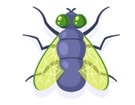
Examples:
- Vectors are generally insects like mosquitoes, houseflies, ticks etc.
- These vectors carry pathogens that multiply in or on their bodies. These pathogens are then transferred to healthy people when the vectors bite them.
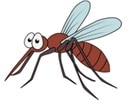
Mosquito Mouthparts:
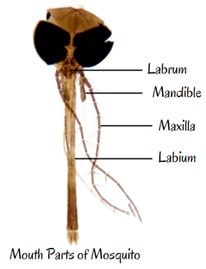
Diseases Caused by Mosquitoes:
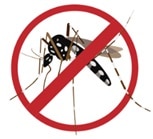
- The rate of mosquito-borne diseases has increased due to the following reasons—
- Urbanisation
- Travelling to different places
- Population explosion.
Let us now discuss a few mosquito-borne diseases.
- Dengue Fever:
- Nausea and vomiting accompanied by belly pain.
- Rashes on the body.
- Body ache along with severe headache.
- Diarrhoea, fever and joint pain.
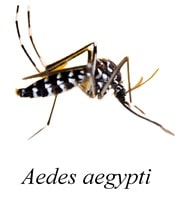
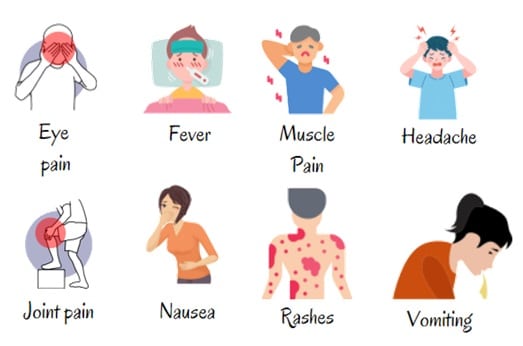
- Treatment:
- Dengue is treated by drugs like paracetamol that controls fevers and body aches.
- Increasing the intake of fluids helps in quick recovery.
- Pregnant women and infants are more prone to dengue and must be under close supervision and treated in isolated healthcare units when required.
- Malaria:
- Fever with chills.
- Fatigue, muscle pain and headaches.
- Breathing troubles and cough.
- Diarrhoea and vomiting.
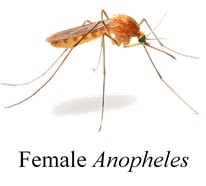
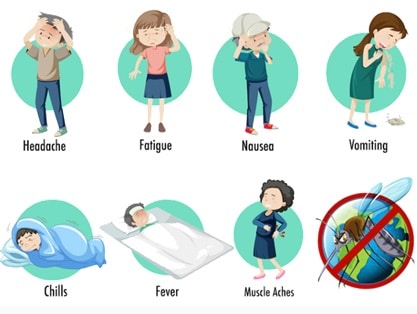
- Treatment
- Since a parasite causes it, the process of treatment includes the drugs which resist the multiplication of malarial parasites.
Examples:
- Quinine and chloroquine.
- Chikungunya:
- Cause: Chikungunya is caused by the chikungunya virus.
- Carrier: The carrier is Aedes aegypti or Aedes albopictus.
- Symptoms:
- Symptoms in chikungunya develop after 5-7 days of infection.
- Fever and joint pain are the most prominent symptoms.
- Headache and muscle pain.
- Swollen joints and rashes.
- Chikungunya Treatment
- Since it is a viral disease, it cannot be cured with any medicine or drugs.
- Drugs like acetaminophen or paracetamol are used to treat fever and joint pain.
- The chances of recurrence of disease in a person who has already suffered from it are less likely.
- Taking rest would allow the body to recover quickly.
- Liquid intake should be increased to prevent dehydration.
Prevention of Diseases Caused by Mosquitoes:
- Female mosquitoes lay their eggs in stagnant water. Hence, to prevent the breeding of mosquitoes, one should not allow water to collect in areas around the house.
- Keep the surroundings clean and dump the garbage in closed pits.
- Use mosquito repellents while going outdoors, especially in the rainy and spring seasons.
- Use nets and bedsheets to cover yourself while sleeping.
- Avoid playing outdoors at dusk and dawn, which is the optimum time for mosquitoes to bite and find hosts.
- The containers used for water storage should be washed and refilled regularly.
- Things like water baths, fountains, pet bowls and swimming pools should be cleaned and disinfected so mosquito larva cannot breed.
- Cover the windows with mesh screens to avoid the entry of mosquitoes into the house.
- Use artificial or natural fumigants like dry neem leaves and cloves to fumigate the house as these do not allow the mosquitoes to grow.



Diagnosis of Mosquito-Borne Diseases:
- Blood Smear Test
- A drop of blood is obtained by pricking the finger for performing a blood smear test.
- This blood drop is smeared on a sterile glass slide.
- This smear is observed under a microscope to check whether any parasite is found.
- A blood smear test is done for the diagnosis of malarial parasites.
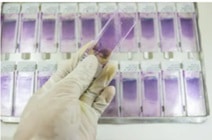
New Words
Dehydration: Excessive loss of body fluids which leads to harmful effects.
Fatigue: Tiredness or exhaustion.
Anticoagulant: Something that prevents the blood from clotting.
Did You Know?
- Tulsi plant is a natural repellent for mosquitoes. It does not allow the larvae to grow and keeps the mosquitoes away.
- Mosquitoes do not like the smell of burnt rosemary and stay away.
- Burning camphor in a closed room is an effective remedy for keeping the mosquitoes away.
- Light coloured clothes keep the mosquitoes away as they are more attracted to dark colours.
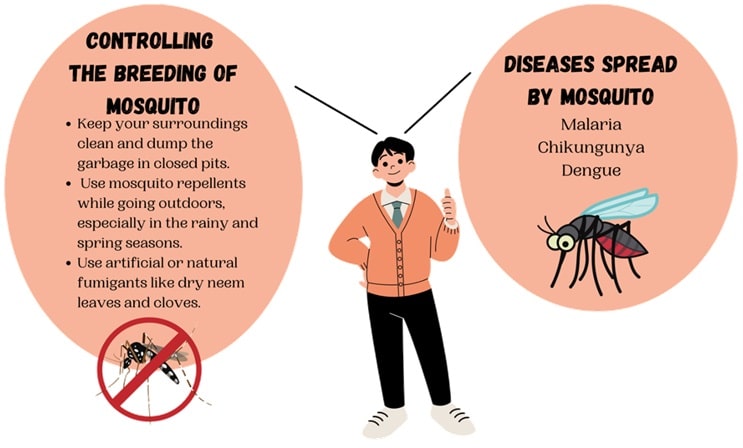
CBSE Schools In Popular Cities
- CBSE Schools in Bangalore
- CBSE Schools in Mumbai
- CBSE Schools in Pune
- CBSE Schools in Hyderabad
- CBSE Schools in Chennai
- CBSE Schools in Gurgaon
- CBSE Schools in Kolkata
- CBSE Schools in Indore
- CBSE Schools in Sonipat
- CBSE Schools in Delhi
- CBSE Schools in Rohtak
- CBSE Schools in Bhopal
- CBSE Schools in Aurangabad
- CBSE Schools in Jabalpur
- CBSE Schools in Jaipur
- CBSE Schools in Jodhpur
- CBSE Schools in Nagpur
- CBSE Schools in Ahmednagar
- CBSE School In Tumkur











